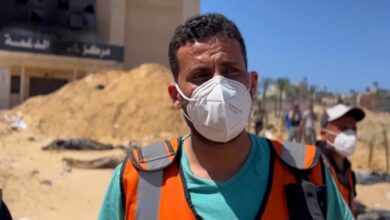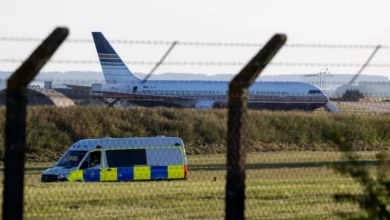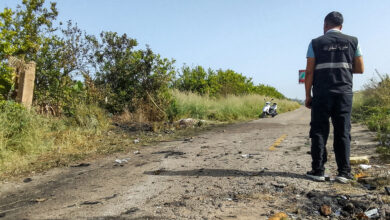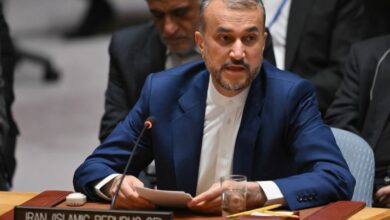VIENNA — Iran, facing harsher sanctions targeting its economically vital oil exports, has told world powers it wants to resume long-frozen talks soon but left vague whether it is ready to address concerns about its nuclear activity, as they insist.
Tehran made the offer in a letter to the EU's foreign policy chief obtained by Reuters on Thursday, a day after it trumpeted several advances in nuclear know-how and sent oil prices upward with suggestions of economic reprisal in what may have been moves to boost its leverage before any fresh negotiations.
Iran's president vowed no retreat from its atomic path on Wednesday only for state television to announce the proposal to re-launch talks after a year's break — mixed signals making it difficult to divine what Tehran's intentions were.
Iranian chief negotiator Saeed Jalili's letter said he would have "new initiatives" but did not spell them out. He made one separate reference to "Iran's nuclear issue," without saying whether Tehran was prepared to negotiate on it.
His letter was a reply to one from Ashton in October in which she said the big powers could meet with Iran within weeks if it was ready to "engage seriously in meaningful discussions" tackling concerns about its nuclear quest.
Jalili said he welcomed an earlier statement by Ashton on respecting Iran's right to the peaceful use of nuclear energy.
"No doubt by committing to this approach, our talks for cooperation based on step-by-step principles and reciprocity on Iran's nuclear issue could be commenced," said the English-language letter, obtained by Reuters.
"[A] constructive and positive attitude towards the Islamic Republic of Iran's new initiatives in this round of talks could open positive perspective for our negotiation," Jalili said.
"Therefore … I propose to resume our talks in order to take fundamental steps for sustainable cooperation in the earliest possibility in a mutually agreed venue and time."
Jalili added that dialogue should focus "on a spectrum of various issues which can provide ground for constructive and forward-looking cooperation."
Clashing agendas
His message resembled Iran's agenda in previous abortive talks, floating undefined ideas for security and trade cooperation while avoiding discussion of steps sought by world powers to guarantee that its nuclear program is peaceful in nature and transparent for the UN atomic watchdog.
A spokeswoman for Ashton confirmed receipt of the letter on Wednesday, saying she was evaluating it and would consult with the six powers on a response.
The United States and its allies suspect Iran is seeking to develop nuclear weapons capability under cover of a declared civilian nuclear energy program, and believe Tehran has sought to buy time with talks about unrelated matters.
Iran says it is enriching uranium only for electricity for a rapidly growing population.
Ashton handles the Iran file on behalf of six world powers — the United States, Russia, China, Germany, France and Britain.
Negotiations have been frozen since a fruitless meeting in Istanbul in January 2011.
Tensions have soared since the UN nuclear inspectors issued a report in November detailing intelligence reports indicating that Iran has worked on designing a nuclear weapon.
Iran's ambassador to Moscow, Seyed Mahmoud Reza Sajjadi, told a news conference that Tehran would accept "no preliminary conditions" for progress in any further talks.
He was responding to a question about a Russian suggestion that, as a first step toward a resolution of the standoff, Iran could take measures including freezing the number of centrifuges for uranium enrichment at current levels in return for assurances it would face no additional sanctions.
Defiant on oil sanctions
Sajjadi also shrugged off Iran's shrinking oil trade with countries punishing Tehran over its nuclear program, asserting that Iran — which has been heavily dependent on imported fuel — would benefit from any ban on its crude exports by boosting domestic production of refined fuels.
"Iranians will show the whole world how they can use an embargo as an opportunity," he said.
Tehran's determination to pursue its nuclear program has shown no sign of wavering despite Western sanctions that are inflicting increasing damage on its oil-based economy.
To underline that it could withstand whatever punishment the West imposes on it, Iran proclaimed three nuclear achievements on Wednesday.
They consisted of a "new generation" of centrifuge machine able to refine uranium three times as fast as the outdated, erratic model it is using now, a major increase in the number of centrifuges available for enrichment, and loading a research reactor with Iran's first batch of domestically produced fuel.
If Iran succeeds in introducing modern centrifuges for production, it could significantly shorten the time needed to stockpile enriched uranium, which can generate electricity or, if refined much more, produce nuclear explosions.
But it remains unclear whether Tehran, under increasingly strict trade sanctions, has the means and components to make the more sophisticated machines in industrial quantities.
Western diplomats and analysts said the Iranian announcements were largely hype and bluff, noting that Iran has been trying to develop several newer versions of centrifuges for years without introducing them into production
Fears of war
The United States and Israel have not ruled out military action against Iran if diplomacy and sanctions fail.
Iran has threatened retaliation for any attack or effective ban on its oil exports, suggesting it could seal off the main Gulf export shipping channel, the Strait of Hormuz, used by a third of the world's crude oil tankers.
Iran's Oil Ministry denied a state media report that it had cut off oil exports to six EU states, while leaving open the option as a pre-emptive strike against an EU plan to launch an embargo on Iranian oil on 1 July.
Whether erroneous or just premature, the media report caused a spike in oil prices to their highest level since August.
The Islamic Republic is the world's No. 5 oil exporter, with 2.6 million barrels going abroad daily, about a fifth of it to EU countries.
Western sanctions are spreading to block Iran's oil exports and central bank financing of trade, and Tehran has resorted to barter to import staples like rice, cooking oil and tea, commodities traders say.
The Obama administration is also pressing the European Union and SWIFT, the global organization that facilitates most of the world's cross-border payments, to expel Iranian banks from its network, a new step in the push to deprive Iran of funds, a US official said on Wednesday.
Expelling Iranian banks from the Belgium-based Society for Worldwide Interbank Financial Telecommunication would cut off one of Iran's few remaining avenues to do business abroad.
European banking regulators may meet SWIFT's board on Thursday to discuss the issue, two sources familiar with the matter said. SWIFT has said previously it is working to resolve the issue but is just a messaging system for its 10,000 users.




